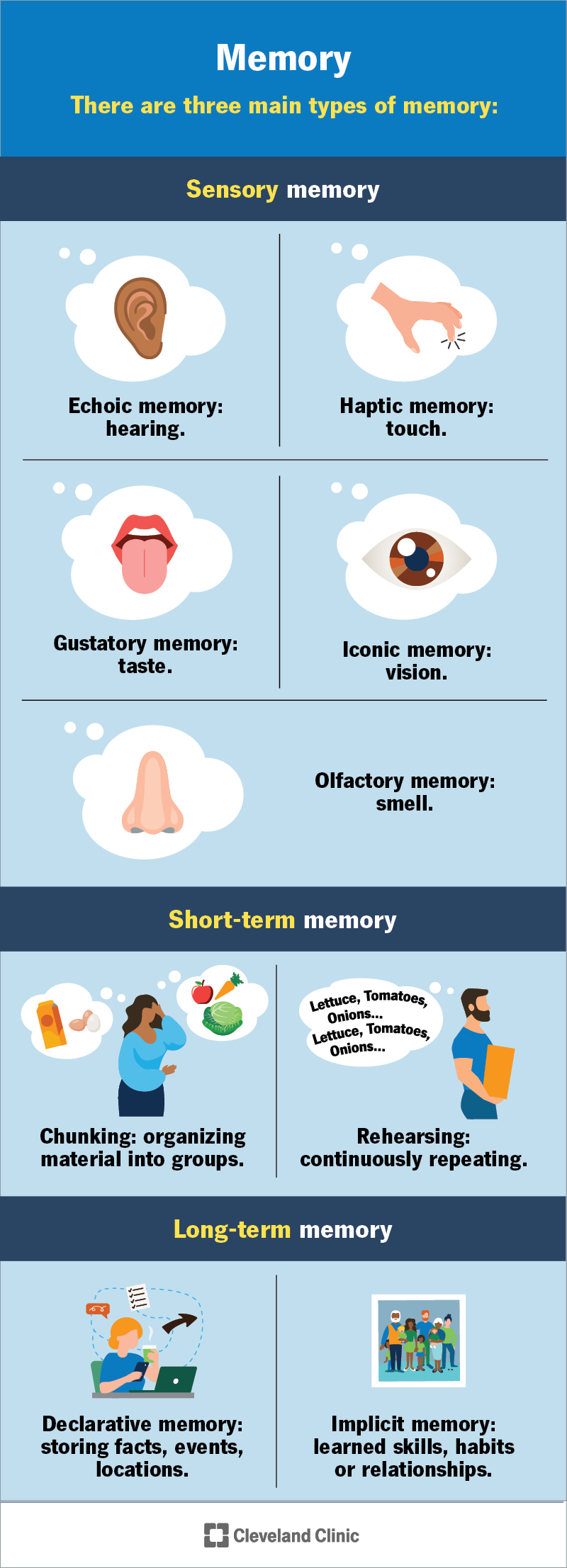Memory is how your brain processes and stores information so you can access it later. Most memory formation happens in your hippocampus, but the process also involves many other connected brain regions. The three main types of memory are short-term, long-term and sensory memory. Several conditions can affect how well your memory works.
Advertisement
Cleveland Clinic is a non-profit academic medical center. Advertising on our site helps support our mission. We do not endorse non-Cleveland Clinic products or services. Policy

Image content: This image is available to view online.
View image online (https://my.clevelandclinic.org/-/scassets/images/org/health/articles/memory)
Memory is the process of recalling information that you learned. Many parts of your brain work together to collect information and store it so you can find and access it when you need it. There are different ways memory can be classified.
Advertisement
Cleveland Clinic is a non-profit academic medical center. Advertising on our site helps support our mission. We do not endorse non-Cleveland Clinic products or services. Policy
Memory is a vital human process. You use it for problem-solving, like answering a question on a test. It helps you plan and navigate through familiar and unfamiliar places. It involves your language development (remembering someone’s name, for example). Your memory also helps with reasoning, like avoiding things that previously caused you harm.
As you get older, your memory may not work as quickly as it used to. This is a normal part of aging. But sometimes, underlying conditions can affect how well the parts of your brain responsible for memory function. A healthcare provider can help you if you have any questions about your memory.
There are three main types of memory:
Sensory memory types represent each of your senses:
Advertisement
Short-term memory has a limited capacity and duration. You can think of short-term memory as an exclusive VIP club. You can only stay there for a little bit before someone escorts you out.
You can, however, manipulate your short-term memory by increasing the capacity and duration. There are two strategies to do this:
Because you can organize, process and use information from short-term memory, researchers coined the terms “working memory” or “short-term working memory” and use them interchangeably.
There are two main types of long-term memory:
There are four parts to every memory:
Your brain has a very specific strategy for gathering, encoding, storing and retrieving memories. It involves the coordinated efforts of neurons (nerve cells), neurotransmitters, synapses and many different brain regions.
Memories form in your hippocampus. This is a part of a larger structure (temporal lobes). The temporal lobe sits behind your temples. You have a temporal lobe (and hippocampus) on each side of your head. They help with memory retrieval.
Other parts of your brain participate in memory processes:
Memory disorders are conditions that target and damage the parts of your brain that regulate memory. These conditions may cause symptoms that affect more than just your ability to remember.
Advertisement
Common examples of conditions that may affect different aspects of your memory include:
Yes, genetics can affect your memory in the following ways:
Your memory is made up of life experiences and interactions with your surroundings. Memories themselves don’t pass through your genes.
You’re constantly learning new things and having new experiences. While you might think of your brain as a hard drive where you store all sorts of information, your brain selects the most important memories to keep over others instead of storing everything.
Advertisement
There are things outside of your control that can affect your memory, too, like underlying conditions or injuries that damage memory-forming or storing parts of your brain.
A lack of sleep, trauma or stress may make thinking and remembering clearly more challenging. In certain situations, your brain may choose to protect you from harmful memories by blocking them out (selective memory).
Talk to a healthcare provider if you’re forgetting more than you’re able to remember.
Your lived experiences become part of who you are. You’re constantly recalling those experiences to learn from them. Whether it’s remembering not to touch a hot stove, the color of your childhood bedroom wall or the three things you need to pick up from the grocery store, your memory is continuously working.
There are times you might remember an acquaintance’s name; other times, you might forget the answer to a question on an exam. When your memory isn’t working well, it can be frustrating. But you’re human and as such, your brain isn’t perfect at organizing and retrieving memories every time.
Sometimes, your health can affect how well your memory works. There are things you can do to improve your memory, like getting better sleep and reducing your stress. But sometimes, at-home treatment isn’t enough. If you’re concerned about how well you’re able to remember, talk to a healthcare provider.
Advertisement

Sign up for our Health Essentials emails for expert guidance on nutrition, fitness, sleep, skin care and more.
Learn more about the Health Library and our editorial process.
Cleveland Clinic’s health articles are based on evidence-backed information and review by medical professionals to ensure accuracy, reliability and up-to-date clinical standards.
Cleveland Clinic’s health articles are based on evidence-backed information and review by medical professionals to ensure accuracy, reliability and up-to-date clinical standards.
It can be unsettling when your brain stops working like it used to. Cleveland Clinic’s cognitive decline experts help you manage the symptoms and provide support.
